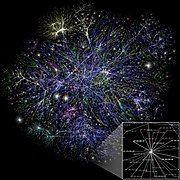Portal:Internet
The Internet PortalThe Internet (or internet) is the global system of interconnected computer networks that uses the Internet protocol suite (TCP/IP) to communicate between networks and devices. It is a network of networks that consists of private, public, academic, business, and government networks of local to global scope, linked by a broad array of electronic, wireless, and optical networking technologies. The Internet carries a vast range of information resources and services, such as the interlinked hypertext documents and applications of the World Wide Web (WWW), electronic mail, internet telephony, and file sharing. The origins of the Internet date back to research that enabled the time-sharing of computer resources, the development of packet switching in the 1960s and the design of computer networks for data communication. The set of rules (communication protocols) to enable internetworking on the Internet arose from research and development commissioned in the 1970s by the Defense Advanced Research Projects Agency (DARPA) of the United States Department of Defense in collaboration with universities and researchers across the United States and in the United Kingdom and France. The ARPANET initially served as a backbone for the interconnection of regional academic and military networks in the United States to enable resource sharing. The funding of the National Science Foundation Network as a new backbone in the 1980s, as well as private funding for other commercial extensions, encouraged worldwide participation in the development of new networking technologies and the merger of many networks using DARPA's Internet protocol suite. The linking of commercial networks and enterprises by the early 1990s, as well as the advent of the World Wide Web, marked the beginning of the transition to the modern Internet, and generated sustained exponential growth as generations of institutional, personal, and mobile computers were connected to the internetwork. Although the Internet was widely used by academia in the 1980s, the subsequent commercialization of the Internet in the 1990s and beyond incorporated its services and technologies into virtually every aspect of modern life. (Full article...) Selected articleHomestar Runner is a Flash animated Internet cartoon. It mixes surreal humor with references to 1980s and 1990s pop culture, notably video games, classic television and popular music. Originally conceived as a parody of what the authors considered to be the surplus of low-quality picture books written for children, the site mostly caters towards young adults. Most of the site's traffic comes from the United States; events in the cartoon itself usually take place in Free Country, USA. The cartoons are nominally centered on Homestar Runner. However, the series entitled Strong Bad Email, in which another main character, Strong Bad, answers emails from viewers, is the most popular and prominent feature of the site. While Homestar and Strong Bad are the main characters, the site has grown to encompass dozens of other characters over the years. The site is one of the most popular Flash cartoons on the Internet and is notable for its refusal to sell advertising space (the creators pay for everything through merchandise sales, which includes a line of T-shirts). It grew in popularity largely through word of mouth. Selected picture A wireless LAN or WLAN is a wireless local area network, which is the linking of two or more computers without using wires. WLAN utilizes spread-spectrum or OFDM modulation technology based on radio waves to enable communication between devices in a limited area, also known as the basic service set. This gives users the mobility to move around within a broad coverage area and still be connected to the network. YouTube Rewind 2018: Everyone Controls Rewind (also known as YouTube Rewind 2018) is a video that was uploaded to the official channel of the video-sharing website YouTube on December 6, 2018, as the ninth installment of the YouTube Rewind series. The video features references to video games and internet culture, starring YouTubers such as Ninja and Marques Brownlee, as well as celebrities like Will Smith and Trevor Noah. YouTube Rewind 2018 was panned by critics, YouTubers, and viewers alike, who dubbed it the worst YouTube Rewind video to date. The video was criticized for the inclusion of unpopular or outdated trends and the exclusion of many prominent YouTubers of the year, as well as rivalries such as KSI vs Logan Paul and PewDiePie vs T-Series. By December 13, 2018, a week after its upload, Everyone Controls Rewind had over 10 million dislikes, making it the most-disliked video on YouTube of all time, a record that was previously held by the music video for Justin Bieber's "Baby" for over seven years. (Full article...) WikiProjects
Did you know (auto-generated) -
Selected biography
Jonathan Bruce Postel (6 August 1943 – 16 October 1998) made many significant contributions to the development of the Internet, particularly in the area of standards. He is principally known for being the Editor of the Request for Comment (RFC) document series, and for serving as the Internet Assigned Numbers Authority until his death. While studying at UCLA, he was involved in early work on the ARPANET; he later moved to the Information Sciences Institute at the University of Southern California, where he spent the rest of his career. Postel served on the Internet Architecture Board and its predecessors for many years. He was the original and long-time .us Top-Level Domain administrator. He also managed the Los Nettos Network. The Internet Society's Postel Award is named in his honor, as is the Postel Center at Information Sciences Institute.
General images -The following are images from various internet-related articles on Wikipedia.
Selected quoteMain topics
Featured contentCategoriesRelated portalsThings you can do
Associated WikimediaThe following Wikimedia Foundation sister projects provide more on this subject:
Wikipedia's portals |




















































